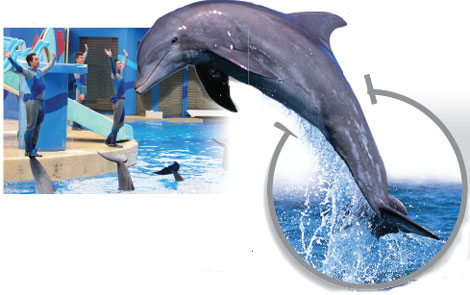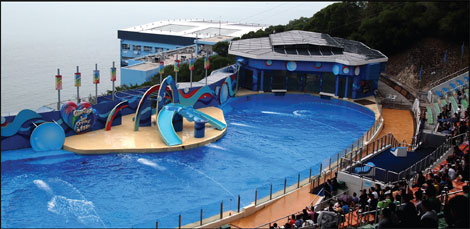Curtain call for dolphin shows
Updated: 2011-12-07 07:25
By Simon Parry(HK Edition)
|
|||||||||
|
Dolphins leap through the air at the Sea Dreams performance in Ocean Park's Ocean Theatre. Georgina Parry / Red Door News |
Four months after its decision not to import wild-caught beluga whales, Ocean Park is under pressure from animal welfare groups and one of its own former chief veterinarian to phase out its hugely popular live dolphin performances. Simon Parry reports.
It's one of Hong Kong's top tourist attractions. Every day, audiences crowd into the open-air auditorium at Ocean Park to cheer as dolphins perform gravity-defying stunts, leaping through the air and pushing staff in wet suits through the water in a dazzling, choreographed show.
The dolphin show - called Sea Dreams and featuring a narrative of a grandfather telling his granddaughter how humans and dolphins can live in harmony - is an Ocean Park staple and is arguably almost as synonymous with the venue as Mickey Mouse is with Disneyland.
But for animal welfare campaigners, the show that draws a respectable portion of Ocean Park's 5 million annual visitors is an anachronism - a "circus" show that they say teaches little about conservation or the current plight of wild dolphins and should be consigned to the past.
Now, four months after abandoning controversial plans to import wild-caught beluga whales, following pressure from animal welfare groups, Hong Kong's No 1 theme park is being urged to go further and to phase out the dolphin shows that have entertained generations of visitors.
Ocean Park strongly defends its dolphin shows, saying they get a powerful conservation message across in an effective way and claiming that the behavior displayed by the dolphins during the shows is natural and that they are free to participate or not.
Critics of the dolphin shows, however, are not limited to animal welfare groups. A former chief veterinarian and research associate who worked at Ocean Park for 15 years has also called on the theme park to consider different ways to present its animals to the public.
Speaking for the first time since resigning from her Ocean Park post in 2007, Reimi Kinoshita said she left after becoming increasingly uncomfortable with the shows and the park's policies, including its insistence on continuing to acquire animals from the wild.
"Wild-caught animals are going to be stressed," she said. "They have to go through the stress of capture which is very traumatic and they come here and they have to adjust to everything around, I just don't feel that's right ... I don't think it's right to just grab animals from the wild."
Kinoshita, whose work at the park included a detailed study into the mortality rates of animals in the park since it opened, said of the dolphins: "They are put into captivity and they are made to work every day of their lives. Some of them I admit do enjoy the show - they find it is something to do. But some find it stressful.
"They are individuals, they are social, and unless we can provide them with their needs, then we shouldn't be keeping them in an environment that they will not thrive in or at least do relatively well in."
Kinoshita said she had hoped Ocean Park would build a sustainable captive population of dolphins and was "dismayed" at a new master plan adopted after Allan Zeman took over as chairman in 2004.
"When the master plan came along they wanted to broaden the facilities and expand, filling them up by going out and grabbing dolphins," she said. Kinoshita said it did not appear to matter to park managers what kind of dolphins they brought in. "They just wanted dolphins because they wanted lots of shows," she said.
In the wake of the decision in August not to import wild-caught beluga whales, however, the future direction of Ocean Park is once more under discussion. For her part, Kinoshita said she would like to see a more natural, educational display of live animals at Ocean Park in a different and more appropriate setting.
The setting she envisaged would see dolphins swim in an environment replicating the shallow coastal waters they inhabit rather than the current large pool they swim in for the shows. "I would like to see the dolphins displayed in a more naturalistic setting rather than this circus-type of presentation," she argued.
"It will be better for the animals ... They can still have performances but it won't be a show as such. They can do more swimming or contact with dolphins and have little slopes or beach like areas where people can more easily go in and interact with dolphins and learn more about them.
"Right now, though, the display is like a captive doing show tricks for our entertainment, which is really not the message you want to put across."
Kinoshita said she was heartened by the decision not to import beluga whales and said: "I feel there is so much potential for Ocean Park and the good it can do for the region. I truly believe that. It's not just the animal welfare. They can change people's attitudes in this region.
"There are many mainland tourists coming in and we need to educate these people on issues like shark fin and the coral reef issue.
"When I worked there I was told 'They want to see shows'. I said we don't have to give them what they want. We should take the opportunity to show them something better.
"The attitude was to give people and give the mainland visitors what they wanted to see. I know money is important but I do feel strongly it can be done in innovative, creative way and can be educational and have a conservation message at the same time as being recreational and entertaining. It just needs the right leaders to commit to that and to make it happen."
Suzanne Gendron, Ocean Park's executive director for zoological operations and education, defended the dolphin shows, insisting they educated guests about dolphins and that the animals themselves "demonstrate natural behavior and are free to join the demonstration".
Gendron told the China Daily: "As ambassadors for their cousins in the sea, our dolphins help connect our guests, especially children, with nature, and inspire wonder and admiration for these incredible animals.
"We strongly believe animal presentations can influence visitors and strengthen their connections to nature.
"Dolphins in the wild jump, leap, swim fast and play. This is natural behavior that we have coupled with cues to allow us to demonstrate the behaviors for our visitors during the presentations at Ocean Theatre."
Gendron added: "Our dolphins are free to move throughout the pools, as are the sea lions on the stage. If they decide not to participate, we ignore the behavior and if they chose to participate, they are positively rewarded with affection, toys, snacks, and even ice.
"Each day they receive a full complement of their needed food regardless of their participation within the demonstrations and presentations."
Responding to the suggestion that the performances were similar to circus shows, Gendron said: "Like Dr Kinoshita, we do not believe animal presentations should be circus shows but rather respectful presentations of the animals to inspire emotional connections and conservation actions by our visitors.
"Since my arrival at Ocean Park in 1998, we have shifted our animal presentations to reflect this philosophy ... We strongly believe animal presentations can influence visitors and strengthen their connections to nature."
The dolphin performance, Gendron argued, put Hong Kong people in touch with the environment around them in a way that might not otherwise happen, because of the increasing disconnection between city people and the natural world.
"Dolphins are the sentinels of the sea," she said. "They are adversely affected by habitat degradation caused by pollution, high boat traffic and overfishing, loss of habitat through landfills and a higher incidence of disease as a result of poor water quality.
"Most people who visit Ocean Park do not have the opportunity to view these magnificent animals in the sea and therefore saving dolphins or oceans is not top of mind in their daily lives.
"Through seeing the dolphins, looking into their eyes and by forming emotional connections with our dolphins, our guests are then more prone to learn important educational messages and to support conservation."
Kinoshita questioned Gendron's claims about dolphins behaving naturally and being free to perform in the shows. "When in the wild do dolphins push people around a pool?" she asked. "Food is still used as the main positive reinforcement to encourage them to perform the way they do. If they choose not to perform, then they are not given fish at that time."
Samuel Hung, chairman of the Hong Kong Dolphin Conservation Society, also questioned the claims, saying: "Dolphins will not wave their tail or just that high. Their behavior is completely distorted and it sends a wrong image of dolphins to the public."
However, Gendron said: "Our dolphins live rich and full lives. Enrichment opportunities are provided to the dolphins in abundance through the toys they play with, the companionship from fellow dolphins they live with, and the interactions they enjoy with our trainers. Through positive behavioral training sessions, our trainers have built a strong and trusting relationship with the dolphins."
|
Crowds watch the Sea Dreams dolphin performance at Ocean Park. Georgina Parry / Red Door News |
(HK Edition 12/07/2011 page4)

